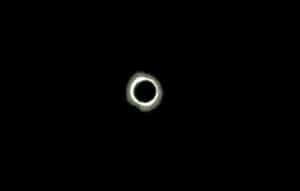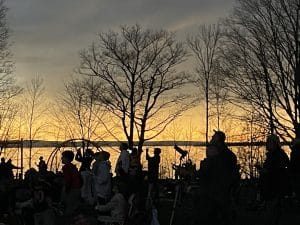Reflections on Totality

Words are the first to go.
When all that is left of the sun is a circle of light surrounding the black disk of the moon, you are reduced to simple instructions and expressions of wonder. You point to the sun and tell your companion, “Look there,” and say over and over to no one in particular something like, “Oh my.” My wife says, “It moves,” and only later explains that seeing that instant when the moon slides in front of the sun tells you something you’ve always known but never appreciated until you see it happen.
You’ve seen partial eclipses, you understand what makes totality happen, you’ve heard and read about what to expect in a total eclipse. You think you are prepared, but you’re not. You are not prepared because you never imagined you would lose your words.
The great total eclipse of 2024, visible over much of the United States on April 8, had plenty of advance publicity. Enthusiastic first-timers and veteran umbraphiles, eclipse chasers from the Latin for shadow lovers, planned their trips a year or more in advance, consulting weather data, gathering information about the length of totality at various locations, planning driving routes, purchasing airline tickets, and reserving accommodations.
You are always taking a chance when you plan to see a total eclipse. All it takes is an errant cloud to cover the sun for the one to five minutes of totality to cancel the show. If the path of totality runs through a place with notoriously bad weather, especially during the season when the eclipse is expected, your likelihood of success is even smaller. We chose to go to Burlington, Vermont, where only after the fact did I hear that our chances of seeing totality were about 60 percent.
We did not commit to the adventure two years in advance or even one. It was in February, two months before the event, when I bought the special eclipse edition of Sky & Telescope magazine, that we made up our minds to try and see our first total eclipse.
Accommodations in and around Burlington were scarce to nonexistent, so we reserved a room for the night before and the night of the eclipse about halfway between our home in Massachusetts and our final destination. We traveled under a bright blue sky, enjoyed an afternoon and evening at our halfway point and, leaving shortly after sunrise the next day, arrived at a small lakeside park where we planned to observe the eclipse.
A small group of people were just beginning to set up chairs, blankets, telescopes, and cameras on a level patch of lawn with an open view of the sky, and we staked out our own patch of turf among them. We spent the morning exploring the park, observing the sun with eclipse glasses and filtered binoculars and taking practice photos with my filtered Iphone camera.
When the partial phase of the eclipse began, I photographed the sun’s shrinking crescent, and at onset of totality, took one burst of five photos to capture the flash of light creating the image of a diamond on the slender ring of the sun’s corona. I was hoping to catch the moment, but in my efforts to photograph it, I missed seeing it. It was then that my wife directed my attention to the eerie light that had fallen over the lake and mountains on the far shore and turned our fellow watchers into silhouettes.
Words are the first to go and emotional control is quick to follow.
You do not just see a total eclipse. It is something you feel. The world you knew disappears, and where the sun once was there is only the bright ring of its corona encircling the black disk of the moon. The sky grows dark, darkest around the sun and progressively lighter toward the horizon which takes on an otherworldly glow in all directions.
The brighter stars and planets appear in the sky, but you give them only a casual glance because your eyes are riveted on what has become of the sun. Tears come, you choke them back, your voice cracks. You’ve heard about this but never thought it could happen to you. You think you are prepared, but you’re not. You are not prepared because you never imagined you would lose your composure.
Words and emotional control have slipped away and now rational thought itself is in peril.
The sun is gone from the sky, you can’t take your eyes off what remains, and you suddenly know what it’s like to be a Lydian soldier throwing down his sword and making peace with the Medes during the great eclipse of 585 BC, Moses talking with God in the burning bush, or a shepherd trembling before the glory of the heavenly host at the birth of Christ.
If I had grabbed my binoculars at the right time, I would have seen more subtle features in the sun’s corona, but after missing the diamond ring effect at the beginning of totality, I wanted nothing between me and the eclipsed sun for the remainder of the event.
Who studies the plumage on an angel’s wings, I later reasoned, when the sky is ablaze with glory? Was that really a good reason for not using my binoculars or merely a rationalization for trying to undo an earlier mistake by making another? You know about primitive reactions to total eclipses, but you are a person of science and think it could never happen to you. You think you are prepared, but you’re not. You are not prepared because you never imagined you would lose your rational thinking.

The sky grows dark, darkest around the sun and progressively lighter toward the horizon which takes on an otherworldly glow in all directions. Photo courtesy of Dayle Bodnar.
From our observing site, totality lasted a little more than three minutes, a generous run for an eclipse but not nearly long enough. No amount of time would have been long enough to see and process all that was happening in the sky, on the land around us, and in the depths of our own souls.
Totality ended with a burst of light from the five o’clock position on the face of the eclipsed sun before full sunlight gave us back the familiar world we had lost. The crowd cheered perhaps with relief that we had survived this brief extinction of our source of life or just plain gratitude to have witnessed such a grand spectacle. Maybe we were just releasing whatever pent up emotion was left over from our murmuring exclamations of wonder during those magical three minutes. The sky brightened, and as if on cue, a flock of birds flew overhead, reminding us that they too had hunkered down when the sun disappeared.
The people around us began to pick up their belongings and slowly drift off to their parked cars and the ride home. My wife and I had planned to do the same in order to get a jump on the traffic that would be heading south from countless viewing sites in the path of totality. We had planned to leave, but we couldn’t bring ourselves to do it. It would be like leaving a play after the climax and ignoring the denouement where the strands of the plot are drawn together and everything is explained or resolved.
We knew how this play would end with the crescent of the sun increasing in size until it became whole, the full disk that warmed and sustained us restored to its accustomed place in the sky and in our lives. We knew, but we stayed anyway, watching until the end with our hearts yearning for more.
There would be plenty of time to pull the strands of this plot together, to resolve and explain all that had happened, if that were even possible. We started on the drive to our hotel, a distance we covered in 90 minutes in the morning that now took nearly six hours in the tangle of traffic heading home. We talked about little else but the eclipse. We were trying to make the experience last even as we knew it was beginning to slip away and, somewhere in our conversation, found the exact word to describe what we had felt. It was awe, a word so carelessly used in our culture, yet so apt in describing what we had experienced.
Our words were the first to go, followed by our composure, and then our rational thinking. We were awash in awe. We thought we were prepared but we weren’t because we never imagined an experience could be this powerful or a feeling could be this big. Like the sun’s growing disk, they return – rationality, composure, and words. We are back to where we started but enriched by the memory and determined to place ourselves in the path of awe whenever we can.
